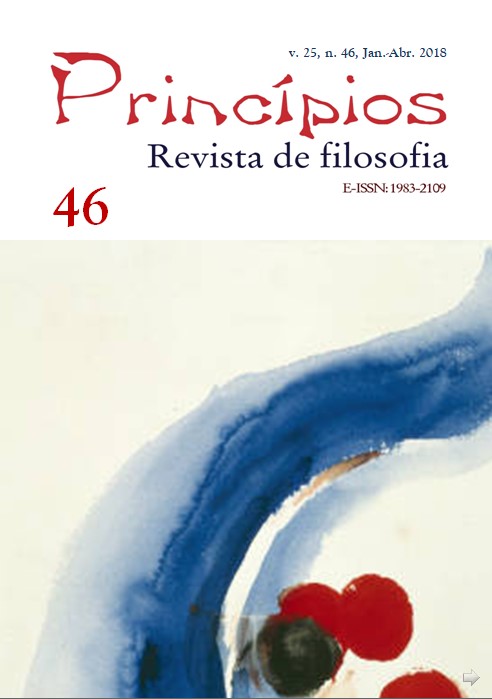"Salvar os corpos", "conectar revoltas": para uma noção de Direito em Camus ["Save the bodies", "connect revolts": for a notion of Law in Camus]
DOI:
https://doi.org/10.21680/1983-2109.2018v25n46ID12347Keywords:
Camus, Direito, Absurdo, Revolta, Limite [Camus, Law, Absurd, Rebellion, Limit]Abstract
Utilizando, principalmente, as noções de Absurdo, Revolta e Limite, este trabalho procura construir uma noção de Direito a partir do pensamento de Albert Camus. Para tanto, o primeiro passo será, com o autor, identificar e criticar um tipo de Direito que, apresentando-se ainda hoje influente, mimetiza o Absurdo para intensificar o exílio do indivíduo no mundo. Em seguida, buscaremos construir uma noção de Direito que, mantendo intensa articulação com as ideias de Revolta e Limite, constitua-se, simultânea e inseparavelmente, em afirmação radical da vida humana e em expressão do agenciamento coletivo da Revolta.
[Using, mainly, the notions of Absurd, Rebellion and Limit, this work aims to build a notion of Law based on the thought of Albert Camus. In order to do so, the first step is to, along with Camus, identify and criticize a kind of Law that, still today, very influential, mimics the Absurd in a way to intensify the individual’s exile in the world. Next, we build a notion of Law that, maintaining an intense connection with the ideas of Rebellion and Limit, represents, simultaneously, a radical affirmation of human life and an expression of the collective agency of Rebellion.]
Downloads
References
ADAMS, Willi Paul. The first American Constitutions: republican ideology and the making of the State Constitutions in the revolutionary era. Trad. Rita and Robert Kimber. Lanham: A Madison House Book, 2001.
AGAMBEN, Giorgio. Estado de exceção. Trad. Iraci D. Poleti. 2. ed. São Paulo: Boitempo, 2004.
CAMUS, Albert. Réflexions sur la guillotine. In: CAMUS, Albert; KŒSTLER, Arthur. Réflexions sur la peine capitale. Paris: Calmann-Lévy, 1957. p. 119-170.
CAMUS, Albert. VII. Ni victimes ni bourreaux: sauver les corps. In: Actuelles I. Écrits politiques (Chroniques 1944-1948). Paris: Gallimard, 1972. p. 121-124.
CAMUS, Albert. The myth of Sisyphus and other essays. Trad. Justin O'Brien. Vintage: Nova Iorque, 1991.
CAMUS, Albert. A queda. Trad. Valerie Rumjanek. 9. ed. Rio de Janeiro: Record, 1996.
CAMUS, Albert. O homem revoltado. Trad. Valerie Rumjanek. 4. ed. Rio de Janeiro: Record, 1999.
CAMUS, Albert. O estrangeiro. Trad. Valerie Rumjanek. 24. ed. Rio de Janeiro: Record, 2004.
CAMUS, Albert. Noces. Œuvres complètes, Vol. I (1931-1944). Paris: Gallimard, 2006a. p. 105-116.
CAMUS, Albert. Interview d’Albert Camus par Dorothy Norman. Œuvres complètes, Vol. II (1944-1948). Paris: Gallimard, 2006b. p. 674-677.
CAMUS, Albert. O mito de Sísifo. Trad. Ari Roitman e Paulina Watch. 2. ed. Rio de Janeiro: BestBolso, 2012.
CAMUS, Catherine. Albert Camus, solitaire et solidaire. Neuilly-sur-Seine: M. Lafon, 2009.
CARROLL, David. Rethinking the Absurd: Le mythe de Sisyphe. In: HUGUES, Edward J. (Org.). The Cambridge Companion to Camus, Cambridge: Cambridge University Press, 2007. p. 53-66.
CHOUKR, Fauzi. H. Processo penal de emergência. Rio de Janeiro: Lumen Juris, 2002.
HARDT, Michael; NEGRI, Antonio. Declaração: isto não é um manifesto. Trad. Carlos Szlak. São Paulo: n-1, 2014.
HESIOD, Theogony. Trad., prolegômeno e comentários Martin Litchfield West. Oxford: Oxford Clarendon Press, 1966.
HORNBLOWER, Simon et al. (Ed.). The Oxford Classical Dictionary. 4. ed. Oxford: Oxford University Press, 2012.
MATTÉI, Jean-François. Citations de Camus expliquées. Paris: Eyrolles, 2013.
MOURA, Maria Thereza Rocha de Assis. Notas sobre a inconstitucionalidade da Lei 10.0792/2003, que criou o regime disciplinar diferenciado na execução penal. In: CARVALHO, Salo. (Org.). Crítica à execução penal. 2. ed. Rio de Janeiro: Lumen Juris, 2007. p. 283-292.
RICŒUR, Paul. O homem revoltado (1956). In: RICŒUR, Paul. Leituras 2: a região dos filósofos. Trad. Marcelo Perine e Nicolás Nyimi Campanário. São Paulo: Loyola, 1996. p. 81-96.
SITRIN, Marina; AZZELINI, Dario. They can’t represent us!: reinventing democracy from Greece to occupy. Londres: Verso, 2014.
Downloads
Published
How to Cite
Issue
Section
License
Authors retain copyright and grant the journal right of first publication with the work simultaneously licensed under a Creative Commons Attribution License that allows others to share the work with an acknowledgement of the work's authorship and initial publication in this journal.


 Português (Brasil)
Português (Brasil) English
English Español (España)
Español (España) Français (Canada)
Français (Canada)


